Norway’s part-state owned oil and gas enterprise Statoil has made a “significant” discovery of oil and gas in the Norwegian section of the Barents Sea – thought to be the most significant find on the Norwegian shelf during the last 10 years.

The Barents Sea, which lies north-east of Norway and directly above the Russian city of Murmansk, was a source of much contention between Norway and Russia until an historic border agreement was signed between the countries just last year. The sea has been explored for oil and gas since the 1970s, and the exploration units in the Skrugard area have now detected a 33 meter gas column and a 90 meter oil column, which could yield up to 500 million barrels worth of recoverable oil equivalent with an estimated sale value of between NOK 100 and 165 billion (over USD 18 to nearly USD 30 billion).
‘Breakthrough’ in the Barents
Statoil already dominates the only gas and oil field in the Barents Sea so far at Snøhvit (Snow White), where the company runs 60 of the 80 existing wells. Its find in Skrugard comes after cooperation with Petoro, a fully state-owned company that manages offshore oil and gas on behalf of the government, and Eni Norge.
Tim Dodson, the head of Statoil’s exploration division, commented in a press statement that “the find in Skrugard is significant and a breakthrough for frontier exploration in the Barents Sea,” with the discovery seen as opening “a new oil province that can yield a further growth in resources.” He suggested that it would take “between five and 10 years from the find to production,” stressing that the company “has ambitions to begin production in the fastest time possible.” He was not able to guess at the potential for the area as a whole, but believes that the oil is of “fine producible quality.”
Speaking to E24.no, the information director of Statoil, Ola Anders Skauby, was jubilant, describing this as “a very good day” for Statoil. Skauby confirmed that management were celebrating with non-alcoholic champagne and waffles, and hoped that “they are celebrating on the oil rigs too.” Statoil’s share price increased immediately following the news. Petoro also celebrated the find, despite their chief executive having only recently commented to E24 that he was worried that Norway was not finding enough new oil and gas.

‘Optimism’ over further finds – but opposition possible
Petro Arctic, an industry group that represents companies wishing to develop the Barents Sea field, also welcomed the discovery. Leader Arvid Jensen noted that “there has been pessimism and negative prognoses connected to the Barents Sea” before, meaning that the find “will lead to a new, strong optimism.” He added that “there are strong possibilities that the find will become bigger than what we see today,” especially given the “similar geology in surrounding areas,” which could lead to the Barents Sea becoming one of the largest oil provinces in Europe.
Nonetheless, development in the Barents Sea has been opposed by a number of Norwegian environmental campaign groups, who believe the area is too sensitive for oil and gas production. In 2002, members of youth environmental group Nature and Youth were arrested for blocking construction of a liquefied natural gas (LNG) plant on the island of Melkøya, which is linked to the Snøhvit field.
Views and News from Norway/Aled-Dilwyn Fisher
Click on our Readers Respond forum if you’d like to comment on this story.

